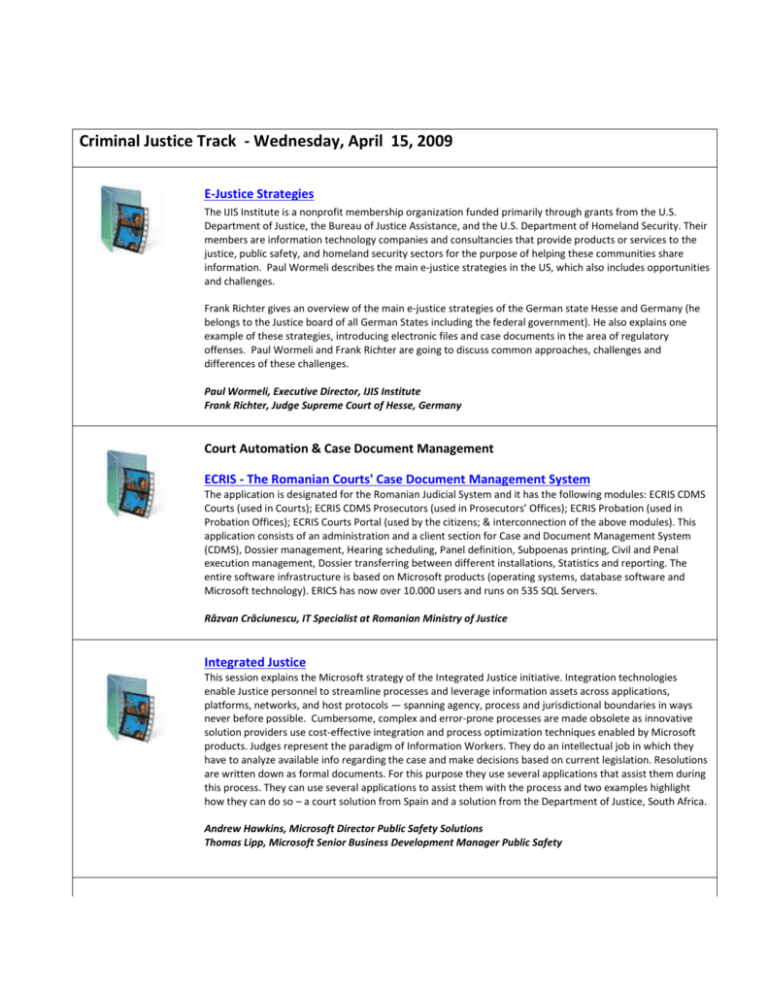Criminal Justice Track Videos
advertisement

Criminal Justice Track - Wednesday, April 15, 2009 E-Justice Strategies The IJIS Institute is a nonprofit membership organization funded primarily through grants from the U.S. Department of Justice, the Bureau of Justice Assistance, and the U.S. Department of Homeland Security. Their members are information technology companies and consultancies that provide products or services to the justice, public safety, and homeland security sectors for the purpose of helping these communities share information. Paul Wormeli describes the main e-justice strategies in the US, which also includes opportunities and challenges. Frank Richter gives an overview of the main e-justice strategies of the German state Hesse and Germany (he belongs to the Justice board of all German States including the federal government). He also explains one example of these strategies, introducing electronic files and case documents in the area of regulatory offenses. Paul Wormeli and Frank Richter are going to discuss common approaches, challenges and differences of these challenges. Paul Wormeli, Executive Director, IJIS Institute Frank Richter, Judge Supreme Court of Hesse, Germany Court Automation & Case Document Management ECRIS - The Romanian Courts' Case Document Management System The application is designated for the Romanian Judicial System and it has the following modules: ECRIS CDMS Courts (used in Courts); ECRIS CDMS Prosecutors (used in Prosecutors’ Offices); ECRIS Probation (used in Probation Offices); ECRIS Courts Portal (used by the citizens; & interconnection of the above modules). This application consists of an administration and a client section for Case and Document Management System (CDMS), Dossier management, Hearing scheduling, Panel definition, Subpoenas printing, Civil and Penal execution management, Dossier transferring between different installations, Statistics and reporting. The entire software infrastructure is based on Microsoft products (operating systems, database software and Microsoft technology). ERICS has now over 10.000 users and runs on 535 SQL Servers. Răzvan Crăciunescu, IT Specialist at Romanian Ministry of Justice Integrated Justice This session explains the Microsoft strategy of the Integrated Justice initiative. Integration technologies enable Justice personnel to streamline processes and leverage information assets across applications, platforms, networks, and host protocols — spanning agency, process and jurisdictional boundaries in ways never before possible. Cumbersome, complex and error-prone processes are made obsolete as innovative solution providers use cost-effective integration and process optimization techniques enabled by Microsoft products. Judges represent the paradigm of Information Workers. They do an intellectual job in which they have to analyze available info regarding the case and make decisions based on current legislation. Resolutions are written down as formal documents. For this purpose they use several applications that assist them during this process. They can use several applications to assist them with the process and two examples highlight how they can do so – a court solution from Spain and a solution from the Department of Justice, South Africa. Andrew Hawkins, Microsoft Director Public Safety Solutions Thomas Lipp, Microsoft Senior Business Development Manager Public Safety Integrated Justice - New approach for court applications The German states Lower Saxony and Hesse are jointly developing a new generation for a court business application. The application focuses beyond case and records management into integrating e-justice information with information from other systems (e.g. prosecution, police, and correctional facilities). Document case management is also a key feature to enable complete electronic files. The highlight of the application is a context-oriented user interface based on Microsoft’s next Office version, to help judges, judicial offices and back office workers become more efficient. Dr. Ralph Guise-Ruebe, Chief Information Officer, Ministry of Justice in Lower Saxony, Germany Frank Richter, Judge Supreme Court of Hesse, Germany The Electronic Traffic Information Processing (eTRIP) Initiative The eTRIP Initiative is a collaborative effort among state and local agencies to reduce the inaccuracies, inefficiencies and data entry redundancies of traditional paper-based processes for collecting and exchanging tickets and collision reports. The two centerpiece projects in this effort are the Statewide Electronic Collision & Ticket Online Records (SECTOR) application and the Justice Information Network Data Exchange (JINDEX) message broker. SECTOR is an in-field application that utilizes bar code scanning technology to improve the speed and accuracy of ticket and collision report creation. The JINDEX leverages Microsoft BizTalk to disseminate various message types to collaborating agencies. eTRIP creates a seamless end-to-end electronic document flow across multiple state agencies. Lowell Porter, Director, Washington State Traffic Safety Commission Criminal Justice Track – Thursday, April 16, 2009 Interstate Criminal Justice Information Sharing The CONNECT Project – Interstate Information Sharing The states of Alabama, Kansas, Nebraska and Wyoming have deployed statewide criminal justice information systems and criminal justice portals based upon Microsoft technology. Recently, these states formed a consortium called CONNECT to enable effective sharing of information between the participating states. The information sharing architecture pioneered by CONNECT and currently operational in a multi-state pilot builds upon each state’s operational Microsoft-based systems. Further, CONNECT is the first information sharing initiative built upon Microsoft technology and all of the Global Justice Information Sharing Initiative’s industry standards: the Global Justice Reference Architecture (Global JRA), the National Information Exchange Model (NIEM) and Global Federated Identity and Privilege Management (GFIPM). The presentation will describe the business goals of the CONNECT Consortium, the progress of the operational pilot, a high level architecture of the CONNECT system, and lessons learned. Maury Mitchell, Director of Alabama Criminal Justice Information Center The presentation will describe CONNECT’s technical approach, a high level architecture of the CONNECT solution, how the components work together to share rich criminal justice information between the states, and options to extend and reuse the CONNECT architecture to solve national information sharing challenges. Tim Galante, Director of AIC Government Solutions Judicial Collaboration Evidence & Intelligence in a Digital World Police, intelligence and judicial officers, prosecution attorney and judges need to maintain control of any investigation involving large quantities of digital material, including video or CCTV (closed circuit TV), mobile phone and hard disk material all from a variety of sources and multiple formats. The transition from the analogue to digital world has created significant challenges for the Intelligence and Justice arenas. The requirement for evidential integrity and dynamic intelligence management calls for an expert system such DEMON Manager. This session will explore the dynamics of a Digital Evidence Management Solution capable of processing raw data from the point of capture through to presentation in Court. Michael Wilks, Chief Executive Officer, Scyron Secure Information Exchange This session will cover a brief overview of the Secure Information Exchange Market – Identifying the major trends, challenges and requirements that have been identified by Boldon James during our engagements with organizations throughout the world. This introduction will be followed by a short case study of how Boldon James has helped customers understand and solve the problems they face when dealing with sharing and controlling sensitive information. James Kidd, Head of Marketing, Boldon James Intelligence & Prison Management Wise Intelligence Technology National security requires effective intelligence and accurate situational awareness. Relevant, actionable and timely information is required to successfully tackle a broad range of threats including war, crime, terror, political subversion, illegal immigration and smuggling. The vast amounts of collected data, combined with their resulting organizational issues, impede timely and accurate situational assessments. The challenge faced by intelligence organizations is to improve the workflow that supports decision making and operational activities based on up-to-date, near real-time integrative and actionable intelligence. The WiT™ solution brings together the experience gained by ELBIT Systems Intelligence Division into a comprehensive end-to-end solution for intelligence and justice organizations. Ami Braun, Senior Director of Intelligence Systems, ELBIT Systems Technology Transformation The Puerto Rico Department of Corrections, one of the largest in the US, with 5 Intake Centers, 30 Correctional Institutions, 6 Half way houses and 12 Community Centers, transformed itself from totally manual to fully automated in five (5) years. Mr. Fernandez will present the strategy behind the successful transformation of this complex correctional environment using an innovative approach towards the deployment of technology which yielded over twenty five (25) major applications, a complete deployment of technology to support the applications and a cultural change which embraced automation. Gabriel E. Fernandez Ferrer, Partner and CEO, Truenorth Corporation








